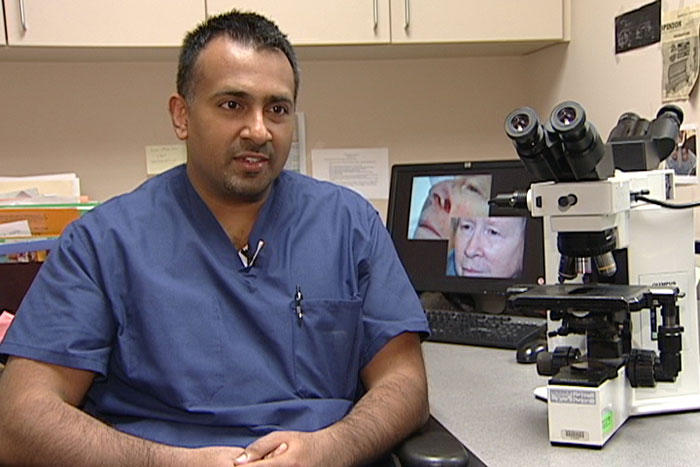When Barbara Newsheller, an avid tennis player most of her life, developed a small, red mark on her nose, she didn’t pay much attention to it. But when her young granddaughter expressed concern, she made an appointment to see UConn dermatologist Dr. Jun Lu, who immediately knew the mark was suspicious.
“When we did the biopsy, it did turn out to be a pretty good size basal carcinoma,” explains Lu.
“She called and said we have to discuss your treatment because it is malignant. And of course, I panicked,” says Newsheller. “All I could think of is, my God, I’m going to lose my nose.”
Lu recommended Mohs micrographic surgery with Dr. Omar Ibrahimi, a fellowship trained Mohs surgeon and a member of the American College of Mohs surgery.
“When you have a skin cancer on the face, it’s like they say in real estate – location, location, location,” says Ibrahimi. “You want a procedure that spares as much of the normal tissue as possible.”
Mohs surgery removes the cancer one layer at a time and each layer is closely examined under a microscope while the patient waits. This allows a minimal amount of tissue to be removed while ensuring complete removal of all the cancer cells. But Barbara’s cancer was in a difficult area where there isn’t a lot of loose skin to use for reconstruction.
“We performed something called a rhombic flap, where we made an incision down her smile line and then moved a portion of her cheek over to cover the defect,” explains Ibrahimi. “Her scar is hidden within her smile line and then along the junction between her nose and her cheek, and that’s a nice place to hide incisions.”
Newsheller is extremely pleased with the results and highly recommends being treated at UConn, an academic medical center. “They have to be up to date on all procedures that are available. There is the research that I think is dynamite. If you don’t have research, you can’t move forward. For all of those reasons, that is why I like UConn.”
Follow the UConn Health Center on Facebook, Twitter and YouTube.



